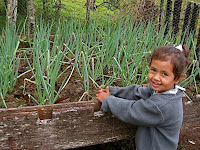This month, for the first time, seventeen children from the indigenous village of Apetina in southwest Suriname will participate in the primary school exams. I sat down with the man who made this all possible, headmaster Arnold Arupa, who came to Apetina six years ago to act as headmaster of the first primary school in the village.
In early days, the missionaries held classes in reading and calculating, lessons that were given in the Wayana language. When Arnold started with a group of the best children in the first grade, his mission was to prepare them to finish the primary school curriculum. It was his goal to prepare them for the exams and he guided them for five years thoroughly.
Although Dutch is the official language, the children found it easier to learn when the official school started as they already had done some basics in their own indigenous Wayana language. This made it easier for them to understand the different subjects such as calculating, spelling and grammar. The hardest subjects for the children were geography and history. Headmaster Arupa had to use all his creativity to bring the information closer to the children and to make them like it.
“It is not easy, when you’ve never been out of the village, to learn about things like the Caribbean, the islands, trucks, ships and roads,” shares headmaster Arupa. “But I am confident that this group is ready for their exams.”
When they finished the first grade, Arnold asked the Ministry of Education for permission to allow the best 20 children to skip a class, because they had done very well, and he guided them as the “exam team.” The children on the team range in age from 12 to 19 years old.
“Now they are ready for it,” he says. “And I am very proud. Almost the whole group is still together; only three children left the group of 20.”
We have a beautiful building now with four teachers from town and one local teacher. I think these children can set an example that it is really possible to succeed at school. I asked Arnold: What they will do after they have succeeded?
“This is a difficult step for all of the children in the interior of Suriname,” Arnold responds. “For further education they have to go to town, there is no other possibility. Sometimes family takes them in, but most of them have to stay in boarding school, which is for most families not financially or socially manageable.”
For now, Arnold concentrates on the exams, the first step to the children’s futures. When the children were asked what they want to become in the future, they answered with a wide range of jobs, but all have a link with their own environment: a pilot, a nurse and most of them, a teacher. One of the children, when asked a few times, said with some hesitation but with an inner confident spirit that he wanted to be a doctor.
“The grades so far have been the best of the interior,” says Arnold proudly. “So I am quite confident they have a good chance.”
It seems headmaster Arnold is even more nervous than the children.
“I know,” he says, with a big smile. “But I really want them all to succeed. I’ve worked such a long time with these kids and I admire them for the effort they and their families at home took to keep on coming to school and learn in an environment which is so very different from what you learn in your schoolbooks.”
Karin Lachmising
Amazon Conservation Team, Suriname
Communication & Information Coordinator





